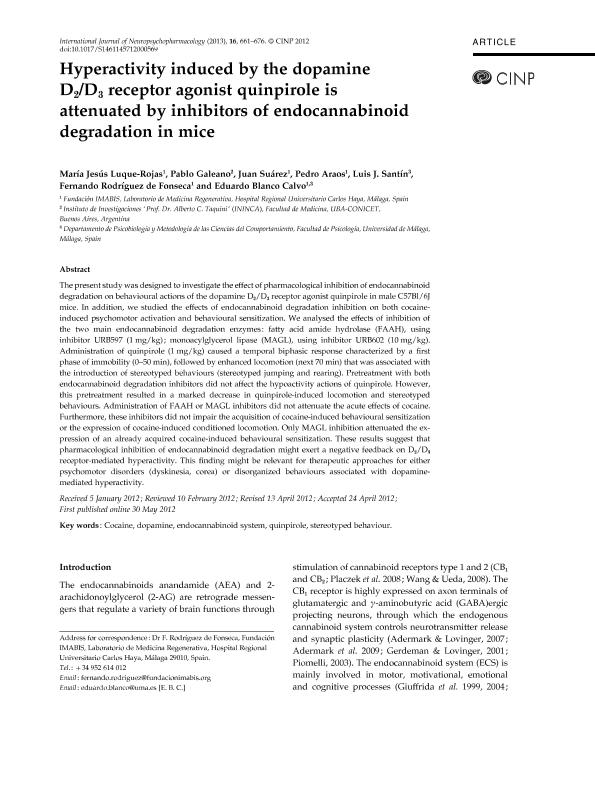Artículo
Hyperactivity induced by the dopamine D2/D3 receptor agonist quinpirole is attenuated by inhibitors of endocannabinoid degradation in mice
Luque Rojas, María Jesús; Galeano, Pablo ; Suarez, Juan ; Araos, Pedro; Santín Nuñez, Luis Javier; Rodríguez de Fonseca, Fernando; Blanco Calvo, Eduardo
; Suarez, Juan ; Araos, Pedro; Santín Nuñez, Luis Javier; Rodríguez de Fonseca, Fernando; Blanco Calvo, Eduardo
 ; Suarez, Juan ; Araos, Pedro; Santín Nuñez, Luis Javier; Rodríguez de Fonseca, Fernando; Blanco Calvo, Eduardo
; Suarez, Juan ; Araos, Pedro; Santín Nuñez, Luis Javier; Rodríguez de Fonseca, Fernando; Blanco Calvo, Eduardo
Fecha de publicación:
04/2013
Editorial:
Cambridge University Press
Revista:
International Journal Of Neuropsychopharmacology
ISSN:
1461-1457
Idioma:
Inglés
Tipo de recurso:
Artículo publicado
Clasificación temática:
Resumen
The present study was designed to investigate the effect of pharmacological inhibition of endocannabinoid degradation on behavioural actions of the dopamine D2/D3 receptor agonist quinpirole in male C57Bl/6J mice. In addition, we studied the effects of endocannabinoid degradation inhibition on both cocaine-induced psychomotor activation and behavioural sensitization. We analysed the effects of inhibition of the two main endocannabinoid degradation enzymes: fatty acid amide hydrolase (FAAH), using inhibitor URB597 (1 mg/kg); monoacylglycerol lipase (MAGL), using inhibitor URB602 (10 mg/kg). Administration of quinpirole (1 mg/kg) caused a temporal biphasic response characterized by a first phase of immobility (0–50 min), followed by enhanced locomotion (next 70 min) that was associated with the introduction of stereotyped behaviours (stereotyped jumping and rearing). Pretreatment with both endocannabinoid degradation inhibitors did not affect the hypoactivity actions of quinpirole. However, this pretreatment resulted in a marked decrease in quinpirole-induced locomotion and stereotyped behaviours. Administration of FAAH or MAGL inhibitors did not attenuate the acute effects of cocaine. Furthermore, these inhibitors did not impair the acquisition of cocaine-induced behavioural sensitization or the expression of cocaine-induced conditioned locomotion. Only MAGL inhibition attenuated the expression of an already acquired cocaine-induced behavioural sensitization. These results suggest that pharmacological inhibition of endocannabinoid degradation might exert a negative feedback on D2/D3 receptor-mediated hyperactivity. This finding might be relevant for therapeutic approaches for either psychomotor disorders (dyskinesia, corea) or disorganized behaviours associated with dopamine-mediated hyperactivity.
Palabras clave:
Cocaine
,
Dopamine
,
Endocannabinoid System
,
Quinpirole
,
Stereotyped Behaviour
Archivos asociados
Licencia
Identificadores
Colecciones
Articulos(ININCA)
Articulos de INST.DE INVEST.CARDIOLOGICAS (I)
Articulos de INST.DE INVEST.CARDIOLOGICAS (I)
Citación
Luque Rojas, María Jesús; Galeano, Pablo; Suarez, Juan ; Araos, Pedro; Santín Nuñez, Luis Javier; et al.; Hyperactivity induced by the dopamine D2/D3 receptor agonist quinpirole is attenuated by inhibitors of endocannabinoid degradation in mice; Cambridge University Press; International Journal Of Neuropsychopharmacology; 16; 3; 4-2013; 661-676
Compartir
Altmétricas



